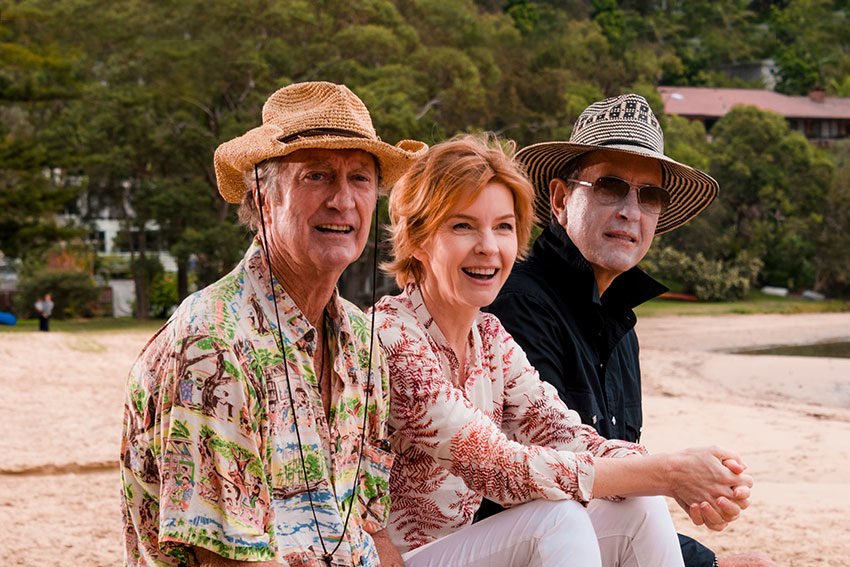Bryan Brown on Palm Beach, parenting and the meaning of swagger

For decades Bryan Brown’s irreverent yet self-assured onscreen persona has helped define how many Australians see themselves. Yet in his latest movie, Palm Beach, Brown’s swagger is swung at by life – and takes a few hits.
Bryan Brown’s character in Palm Beach, Frank, is a former band member and manager of the Pacific Sideburns, who had a hit in the 70s. Aptly, the hit song was Fearless, Frank’s clothing company was Swagger Gear and Frank’s boat is named Swagger. But age-related anxiety and loss of job identity have dulled Frank’s sheen. Even paying for his former bandmates and their partners to stay with him and share his magnificent view of ‘Palmy’ doesn’t remove his angst.
“There’s a reason why Palm Beach was chosen,” Brown tells The Adelaide Review. “The setting has its place in the story. It doesn’t matter where you are: you’re not immune to life. But you do survive things, and family and friends help you.”
“I’m a Sydney boy,” he says when asked if he sees himself as a Sydneysider or an Australian first. “You have to be if you grow up in the western suburbs. I’m grounded in being a westie. But Sydney’s a water city, and I’m lucky I live very close to the harbour. I can get on a ferry to get into town. I go straight to the front every time, sit there, go under the bridge. That eight minutes is the highlight of my day.”

Asked what he thinks of Adelaide, Brown thinks long and hard – perhaps a little too long. “Adelaide and South Australia are so significant in those early days of the [Australian film] resurgence. We were on a plane to Adelaide every 18 months, going somewhere to film. We were young fellas making movies. We thought we were cowboys. There we were on 40-foot screens. It was highly unusual. And it was playtime: dress up, shoot someone, get killed, kiss a girl.
“Two really significant things I did were Breaker Morant [in Burra] and The Shiralee [in Adelaide and Quorn.] And the Flinders, where I did Beautiful Kate, was extraordinarily beautiful.”
Speaking of rural South Australia, The Adelaide Review asks Brown if the other time he played a music manager—Steve Stanley, Paul McCartney’s manager in Give My Regards to Broad Street—was based on Port Pirie-born entertainment mogul, Robert Stigwood.
“Not Robert Stigwood. The man that ran EMI was an Aussie bloke [Steve Shrimpton]. When I read the script, I said to Rachel [Ward, Brown’s wife and director of Palm Beach], ‘This movie has to be the biggest, worst piece of shit for me to say no to. If it’s bad, I’m saying yes because nothing’s going to stop me from saying yes to Paul.’ In that movie, I sang ‘Dip-a-Dee-Doo-Dah’ with him! Are you joking?”
Apart from that memorable duet, having his name sandwiched between Paul McCartney and Ringo Starr in the movie’s opening credits was a unique honour. Brown, a music lover whose mother played piano, has also been associated with other musical greats. James Reyne wrote Fearless, the catchy theme song to Palm Beach. And The Beach Boys performed Kokomo, the chart-topping theme song to Cocktail—in which Brown plays a mentor bartender alongside someone not short on swag himself, Tom Cruise.
Yet Brown, whose charisma and presence saw him cast as a god, Osiris, in Gods of Egypt seems a bit puzzled by the oft-remarked perception of his swagger. “It’s always other people comment about that. You never see it. I did a thing in New York, The Good Wife, with Christine Baranski. A review said, ‘Bryan Brown, who was quite significant in the 80s when he came over, still brings the same swagger.’ And I thought, ‘I have no idea what they’re talking about’.”

Brown’s confidence possibly comes from being authentic. Another clue comes when Brown discusses parenting. “Confidence is incredibly important. It’s important that your children feel confident to tackle a problem. Failing at something’s fine, because you either know success or you learn. Confidence comes from struggling, overcoming, facing up to. You can only get confidence by taking stuff on and failing at times.”
“They’ve got to go out in the world and tackle. What do I give them? What do I teach them? How do I show them? They’re not going to listen … But they do. Because they go, ‘You’ve got to tell me what you reckon. And I hate you.’ And therefore you go, ‘Now I’m doing a good job’.”
The interview finishes. Brown is just as warm and obliging to the photographer. At one point—Errol Flynn-like—Brown slides down a stairway bannister. Then—even more like Flynn—Brown leaps behind the nearby bar. Picking up a shaker, he re-enacts his iconic role in Cocktail (before management eventually tells him to stop).

With his sense of fun, theatre and rebellion, lack of arrogance but stack of confidence, Brown represents the essence of swagger. The fact that he doesn’t see it is even more compelling.
Palm Beach is in cinemas now